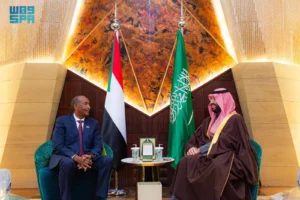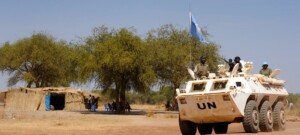UNSC, AU high-level delegations visit Darfur
A delegation of ambassadors from UN Security Council (UNSC) member countries Britain, France, Sweden, and the Netherlands, began a three-day visit to Darfur on Tuesday, which started in El Fasher. An AU delegation began a two-day visit on Monday.
 UNSC delegation meets local leaders in Golo Central Darfur on Tuesday (Picture: Hamid Abdlusalam / Unamid)
UNSC delegation meets local leaders in Golo Central Darfur on Tuesday (Picture: Hamid Abdlusalam / Unamid)
A delegation of ambassadors from UN Security Council (UNSC) member countries Britain, France, Sweden, and the Netherlands, began a three-day visit to Darfur on Tuesday, which started in El Fasher. An AU delegation began a two-day visit on Monday.
The UNSC delegation met with the government of North Darfur and Unamid, which focused on the latest developments in the region. The delegation is assessing the situation in Darfur ahead of the renewal of Unamid’s mandate next month.
The head of the delegation of ambassadors said that their visit to North Darfur was aimed at standing on and assessing the security and humanitarian situation in Darfur and identifying the efforts exerted by the government to improve the situation, as well as the performance of Unamid following its withdrawal from a number of stations.
The UN Security Council delegation met with locality leaders in Golo, Central Darfur, during the first of a three-day visit to the region. (Picture: Hamid Abdlusalam / Unamid)
AU senior panel
A senior panel of the African Union (AU) Peace and Security Council also visited North Darfur and held a series of meetings with government officials, Unamid leadership, and representatives of the displaced. The AU Peace Council team also visited Sortony camp. The visit by the delegation of ambassadors will include South Darfur.

The head of the AU delegation to Darfur, , Ambassador Hope Tumukunde, of Rwanda, speaks to the press after meeting
the Deputy Governor of North Darfur, Mohammad Brima Hasab Al Nabi. (Picture: Ismail Amin / Unamid)
Exit of Unamid
The Sudanese authorities began to push for the exit of Unamid in end 2014, after the peacekeeping mission urged an investigation into a mass rape in North Darfur's Tabit on October 31 that year.
On June 29, the UN Security Council renewed Unamid’s mandate for another year. It also decided on a reduction of the peacekeepers “in two six-month phases while closely monitoring the situation on the ground.” More than a third of the nearly 19,000 Unamid military troops and police officers were to be withdrawn.
In September last year, rebel movements protested the alleged handing of two North Darfur bases to the country’s main militia.
With the handing of the Zamzam team site in North Darfur to the Sudanese authorities on October 21, 2017, Unamid completed the first phaseof the reduction.
Darfur displaced, Sudanese politicians, and international activists have all warned for the consequences of a downsizing of the number of peacekeepers for the people in Darfur.











 and then
and then